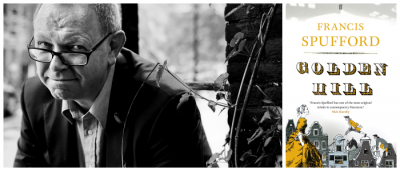Author Spotlight: Francis Spufford
13th May, 2017
Francis Spufford, shortlisted for his first novel, Golden Hill, kindly answered some of our questions. Here are his fascinating answers.
Q: What do you think about being shortlisted for the Walter Scott Prize for Historical Fiction? Do you see yourself as a historical novelist?
A: I think it’s wonderful being on the shortlist. I’m in very good company. I am too new a novelist altogether to be sure whether I want to call myself a historical one, but what I do know is that history has been one of the main stimuli to all of my writing, non-fiction and fiction alike, ever since I began. Something in my imagination is deeply responsive to the way the past provides worlds to explore, different yet also recognisably the same, because always happening whatever the wild variety of cultures within the bounds of what Thucydides called ‘the human thing’. And I’m fascinated by the way the past glints from new surfaces and seems to change, depending on the light shining on it from the present. It probably helps that both my parents were, professionally, historians.
Q: How did the people and times you write about in this novel first lodge in your imagination?
A: I read one sentence about New York beating London at cricket in 1752, and it led me to the era, a generation before the American revolution, when the Anglo-American identity had not yet split into two separate things: when the strains were growing, but the young George Washington and Benjamin Franklin still very firmly thought of themselves as “Englishmen”. New York as a city, I realised when I had done some reading, was also at that time gloriously and provokingly unlike its proverbial later self. Then with a satisfying click in my head, I saw that this theme and setting fitted together with a story I had it in mind to tell, about two liars falling in love.
Q: What role does research have in your writing? When does the fiction take over from the facts?
A: You want to know enough to give your imagination something solid to work on, worry at, react to, grow a pearl around – but not too much; not so much that the detail of history starts to crowd out your scope for invention. Once I had understood the promising political deadlock that gripped New York in 1746, between the ineffectual Governor and a brilliantly ambitious Chief Justice, I deliberately stopped trying to discover more about the characters of those two men. I wasn’t writing historical biography, and I already knew who I wanted them to be. It’s pleasing when people compliment me for my research, but I take it with a pinch of salt. I know how much I’m not a scholar. I know how ruthlessly willing I am to learn just enough and no more to make the view look convincing. Up ahead, where my book is directing your gaze, the vista is carefully specified, but behind, the prop pillars are being wheeled away on little castors.

